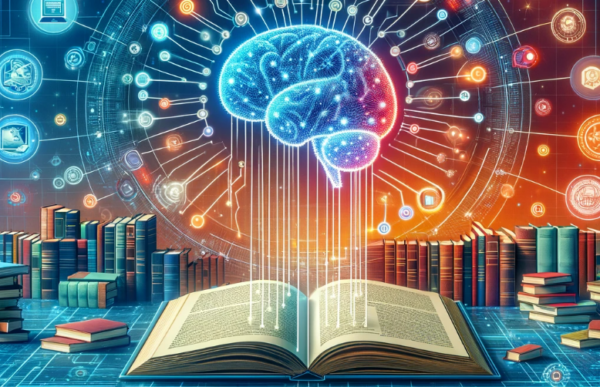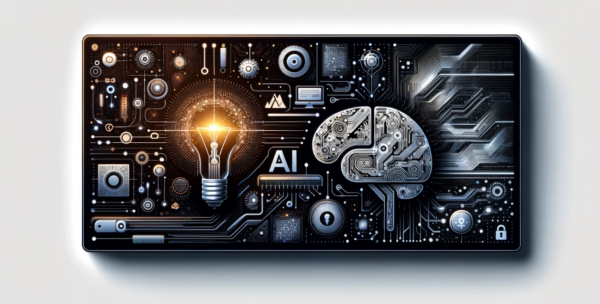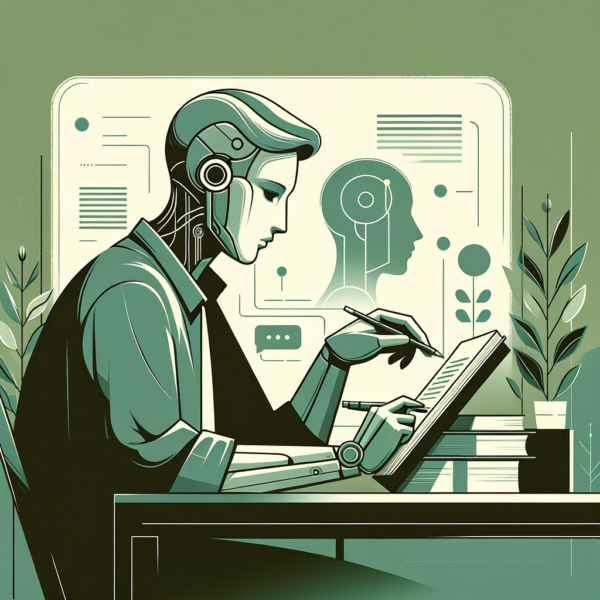Artificial Intelligence (AI) is redefining numerous industries and the realm of publishing is no exception. From humble beginnings as a simple spell-checker, AI for Writing and Editing is now a sophisticated tool capable of generating content, providing stylistic recommendations, mimicking writing styles, and even offering helpful writing prompts and suggestions to help authors get over the dreaded “writer’s block.”
In this article, we’ll delve deep into how AI is revolutionizing the writing process and the publishing industry. We’ll explore the multifaceted role AI plays in the writing process, examine the advancements in AI writing tools and software, and their impact on author’s productivity and the publishing industry. The journey of AI in writing and editing is not just a tale of technological advancement but a narrative of how technology is reshaping creativity and communication in the modern world.

The Rise of AI for Writing and Editing
Though there’s a whole buzz around AI tools for writers today, the collaboration between humans and computers to create the written word is nothing new. In fact, the roots of AI in writing can be traced back to the latter half of the 20th century, with the advent of digital word processors. Of course, these early systems are basic compared to what AI can do today, but they introduced the concept of using technology to assist in writing, primarily through basic spell-check functions which provided a much-welcomed safety net for authors. Later, in the 1990s and early 2000s, the focus expanded to include grammar mistakes and syntax, though these tools were largely rule-based and lacked the contextual understanding that modern AI provides.
The real transformation began with the incorporation of advanced AI technologies, particularly Natural Language Processing (NLP) and Machine Learning (ML). These technologies enabled a shift from simple error correction to more nuanced tasks like style enhancement, content structuring, and even plagiarism detection going beyond mere technical correctness to impact aesthetics and tone.

Current State of AI Technologies
Today, AI in writing and editing is characterized by its remarkable versatility and depth. NLP and ML have matured to understand context, tone, and even the subtle nuances of human language. AI-driven writing tools now offer predictive text generation, sentiment analysis, and personalized writing style recommendations and are an integral part of academic research, professional journalism, and of course, fiction and non-fiction authors. An AI writing assistant is like having 24/7 access to a team of researchers, editors, proofreaders, and critiques for your personal and professional projects. What a time to be alive…
Your Publishing Journey Awaits – Start NowKey Benefits for the Self-Publishing Industry
The self-publishing industry has undergone a remarkable transformation with the advent of AI. This technological advancement offers numerous benefits that are particularly advantageous for independent authors and small publishing entities. AI has democratized the publishing process, making it more accessible, efficient, and competitive and is now a key element of the modern author’s writing workflow.

1. Extensive Editing and Proofreading Capabilities
AI-powered tools have revolutionized the editing process for self-published authors. These tools, equipped with advanced grammar and style checking capabilities, enable authors to refine their manuscripts with a level of precision that was previously attainable only through professional editors. This feature is crucial for self-publishers who often work with limited budgets and cannot afford extensive editing services. AI tools can detect subtle grammatical errors, suggest stylistic improvements, and even offer genre-specific writing advice, thus elevating the overall quality of the published work.
2. Cover Design and Formatting
AI is also making strides in the visual aspects of book publishing. There are AI-based design tools that can create compelling book covers based on genre-specific trends and aesthetic preferences. Additionally, AI can assist in the formatting process, ensuring that the book adheres to various digital and print formatting standards, a task that can be time-consuming and technically challenging for self-publishers.

Streamlined Research
For self-publishing authors, research is a critical but often time-consuming part of the writing process, especially for those writing in non-fiction genres or creating content that requires in-depth subject knowledge. An AI writing tool has the potential to significantly streamline this aspect. AI-powered tools can swiftly sift through vast amounts of data and academic papers, providing authors with relevant information, statistics, and case studies pertinent to their subject matter. This not only accelerates the research process but also ensures a higher degree of accuracy and comprehensiveness in the information gathered.
Moreover, AI can assist in organizing research material and notes, making it easier for authors to access and utilize information during the writing process. For fiction writers, AI tools can help in world-building and character development by providing historical data, cultural information, and sociological insights that can enrich narrative creation.
Content Marketing
Content marketing – especially for self-published authors – is a time-consuming and expensive process. But, there’s no getting around it: it’s essential to make sure your book gets into the hands of your target audience. Thankfully, for those low on time, money and even ideas, AI-assisted content creation is here to save the day. Indeed, AI- can be used to create high-quality content that can help self-publishers in creating marketing materials for their book and build a strong online presence. From writing long-form content like a blog post, or crafting compelling copy for social media posts, to composing concise promotional emails. These tools can generate engaging and relevant marketing copy in just a few seconds, allowing authors to maintain a consistent content output and engage effectively with their audience.
Even if you don’t like the idea of using ai AI-generated content, an AI writing software can help you generate blog outlines, and blog ideas, or simply be used as a grammar checker for consistent content quality.
Your Publishing Journey Awaits – Start NowThe AI Writing Tool: A New Era of Content Creation
The emergence of AI writing tools has ushered in a new era in the field of publishing and other writing and editing-related fields, significantly altering the landscape for writers, marketers, and publishers alike. These tools, harnessing the power of artificial intelligence, have expanded the boundaries of what can be automated and innovated in writing.
Overview of Popular AI Writing Tools and Their Functionalities
Grammarly: Perhaps the most well-known AI writing assistant, Grammarly offers more than just grammar and spelling checks. It uses advanced NLP algorithms to provide style and tone suggestions, making it invaluable for crafting clear, concise, and audience-appropriate content.
Hemingway Editor: This tool focuses on enhancing readability. It highlights complex sentences and suggests simpler alternatives, encouraging a more straightforward and impactful writing style.
OpenAI’s GPT-3: A state-of-the-art language processing AI, GPT-3 can generate human-like text based on given prompts. Its applications range from creating entire articles to generating creative fiction.
QuillBot: Specializing in paraphrasing, QuillBot helps writers rephrase and refine their content. It’s particularly useful for avoiding plagiarism and improving clarity.
Comparison of Features
Each of these tools brings unique features to the table. Grammarly and Hemingway Editor are more focused on refining existing text, enhancing grammar, style, and readability. In contrast, GPT-3 is at the forefront of content generation, capable of creating coherent and contextually relevant text from scratch.
The underlying technology, primarily NLP, varies in complexity and application. While Grammarly and Hemingway use NLP for text analysis and improvement, GPT-3 uses more advanced versions for text generation, showcasing the diverse capabilities of AI in writing.
The Transformative Power of AI Writing Software
AI writing software has brought about a seismic shift in the writing process, significantly impacting how writers, from novices to professionals, approach their craft. These tools are not just about correcting grammar; they encompass a broad spectrum of functionalities that enhance, streamline, and sometimes even revolutionize the way we write.
Changing the Writing Process
Efficiency and Accessibility: AI writing software provide instant feedback, making the editing process faster and more efficient. They are accessible to a wide range of users, from students working on academic papers to professionals crafting business reports.
Enhanced Quality: By providing suggestions for grammar, syntax, and even style, these tools help in elevating the overall quality of writing. They are particularly beneficial for non-native English speakers, offering them a platform to refine their language skills.
Creativity and Inspiration: Beyond the technical aspects of writing, AI assistants can also inspire creativity. They can suggest ideas, phrases, and even whole paragraphs, helping writers overcome blocks and expand their creative horizons.
Key Features of AI Writing Software
Grammar Checker: This fundamental feature helps in identifying and correcting grammatical errors, ensuring that the text is structurally sound and grammatically accurate.
Style Editor: AI writing software can analyze the tone and style of the text, offering suggestions to make it more engaging, professional, or tailored to a specific audience.
Brand Voice Consistency: For businesses, maintaining a consistent brand voice is crucial. AI writing software can be trained to recognize and adhere to a brand’s specific style, ensuring consistency across all written communications.
The Role of Natural Language Processing in AI Writing
Natural Language Processing (NLP) stands at the core of the revolution in AI writing. As a critical technology driving AI writing tools, NLP bridges the gap between human language and computer understanding, enabling machines to process, analyze, and even generate human-like text.
Your Publishing Journey Awaits – Start NowExploring Natural Language Processing
NLP combines computational linguistics with machine learning and artificial intelligence to enable computers to understand, interpret, and manipulate human language. It involves a range of tasks, such as text classification, sentiment analysis, language translation, and entity recognition. In the context of AI writing, NLP enables tools to perform tasks like grammar checking, style editing, contextual spell checking, and content generation.

Evolution and Impact on Content Creation
The evolution of NLP has been remarkable. Initially, NLP systems relied on simple, rule-based algorithms for understanding text, which were limited in scope and effectiveness. However, with the advent of machine learning and deep learning, NLP systems have become increasingly sophisticated and are fast becoming one of the leading content writing tools available. They can now understand nuances, context, and even the subtleties of human emotion in text.
This advancement has had a profound impact on content creation, especially long form content and social media posts. AI writing tools powered by NLP can not only correct grammatical errors but also enhance the style and tone of writing, making it more engaging and effective. Writing articles has never been easier. For example, an AI tool can suggest changes that make a piece of writing sound more formal or informal, depending on the intended audience. Additionally, NLP enables the creation of content that is tailored to specific user preferences or market trends, significantly enhancing the relevance and appeal of the content.
Future Advancements and Potential
The future of NLP in writing and editing is incredibly promising. We are likely to see further advancements in understanding and generating more complex forms of language, such as idiomatic expressions or culturally specific content. Another potential development is real-time language translation, making cross-lingual communication seamless in writing and editing.
Moreover, as NLP systems become more advanced, they will be able to offer more personalized writing assistance, adapting to an individual’s unique style and preferences. This could lead to highly customized writing aids that function almost like a personal writing coach.
In editing, future NLP systems could provide more in-depth analysis of text, offering suggestions for structural improvements, argument strength, and narrative flow. This would significantly enhance the editing process, making it more comprehensive and efficient.
In conclusion, NLP is a foundational technology in AI writing, and its continuous evolution is set to further revolutionize the field of writing and editing. With each advancement, NLP is making writing tools more sophisticated, intuitive, and able to meet all your writing needs.
AI-Generated Content: Opportunities and Ethical Considerations
The advent of AI-generated content has opened up a new world of possibilities in the field of digital content creation. From crafting engaging blog posts to producing compelling ad copy, AI’s capabilities in content generation are vast and varied. However, this technological advancement also brings forth significant ethical considerations and debates about the balance between human creativity and AI efficiency.
Exploring the Range of AI-Generated Content
Blog Posts and Articles: AI tools can generate informative and engaging blog posts based on specific keywords and topics. These tools analyze existing content to produce new articles, ensuring relevance and SEO optimization.
Ad Copy and Marketing Material: AI’s ability to analyze consumer data and trends allows for the creation of targeted ad copies that resonate with the intended audience. This can significantly enhance the effectiveness of marketing campaigns.
Social Media Content: From crafting tweets to Instagram posts, AI can generate concise and engaging content, tailored to the platform and audience, thereby enhancing social media engagement.
Creative Writing and Fiction: AI is also venturing into the realm of creative writing, producing short stories and poetry, showcasing its ability to mimic human creativity.
Ethical Implications and Originality Concerns
The use of AI in content generation raises several ethical issues:
Plagiarism and Originality: AI-generated content often draws from existing material, leading to concerns about originality and intellectual property rights. There is a fine line between inspiration and plagiarism that AI-generated content must navigate.

Transparency: Disclosure of AI usage in content creation is a growing ethical concern. Audiences have the right to know whether the content they’re consuming is AI-generated or human-written, especially in journalism and academic writing.
Bias and Misinformation: AI systems can inadvertently perpetuate biases present in their training data, leading to skewed or misleading content. Ensuring AI-generated content is fair and factual is a major ethical challenge.
Balancing Human Creativity with AI Efficiency
While AI offers unparalleled efficiency in content generation, it cannot fully replicate the depth and nuance of human creativity. The key lies in finding a balance:
Collaborative Approach: Combining human oversight with AI efficiency can lead to high-quality content that is both creative and accurate. Humans can provide context, emotional depth, and ethical judgment that AI currently lacks.
Enhancement, Not Replacement: AI should be viewed as a tool to enhance human creativity, not replace it. It can handle repetitive, time-consuming tasks, allowing human creators to focus on more complex, creative aspects of content creation.
Continuous Monitoring and Improvement: Regularly evaluating and refining AI algorithms can help minimize biases and improve the originality and quality of AI-generated content.
In conclusion, AI-generated content offers immense opportunities for efficiency and innovation in various forms of digital content. However, it is crucial to navigate the ethical challenges and maintain a synergy between human creativity and AI capabilities to ensure the integrity and quality of content in the digital age.
Enhancing Writing Skills with AI: A Tool for Learning and Improvement
Artificial Intelligence (AI) tools have transcended their role as mere facilitators in the writing process to become powerful instruments for learning and improvement in writing skills. These tools provide unique opportunities for both novice writers and seasoned professionals to refine their craft.

AI Tools for Improving Writing Skills and Style
Personalized Feedback: AI writing tools offer personalized feedback, pointing out not just grammatical errors, but also nuances in style and tone. This helps writers understand their strengths and areas for improvement.
Style and Tone Adjustments: By analyzing a vast array of writing styles, AI can suggest alterations to match a desired tone or style, be it formal, conversational, or persuasive. This is particularly beneficial for writers looking to diversify their writing styles.
Vocabulary Enhancement: AI tools can suggest synonyms and complex words to help writers expand their vocabulary, making their writing more vibrant and engaging.
AI as a Learning Tool for Writers
For Novice Writers: An AI writing tool can act as a virtual tutor, offering real-time corrections and suggestions. This is immensely helpful for new writers or non-native English speakers who are still learning the intricacies of the language.
For Professionals: Even experienced writers can benefit from AI tools. They provide a fresh perspective on written content, helping professionals avoid common pitfalls and habitual errors, thereby refining their writing over time.
In summary, AI tools offer a unique and effective avenue for enhancing writing skills across various levels and styles. By providing personalized, immediate feedback and learning support, these tools can significantly contribute to the development of a writer’s skills and the overall quality of their writing.
Comprehensive AI Writing Apps: A One-Stop Solution
In the era of digital content creation, comprehensive AI writing apps have emerged as versatile, all-in-one solutions, catering to a myriad of writing needs. These apps integrate various aspects of writing assistance into a single platform, making them indispensable tools for writers, editors, and content creators.
Overview of All-in-One AI Writing Apps
Comprehensive AI writing apps are designed to offer a wide range of functionalities, from basic grammar checking to advanced content generation and style editing. These apps typically combine several AI-driven features such as natural language processing, text analysis, and predictive typing to aid in various stages of the writing process. They are adaptable to different writing formats, whether it’s academic papers, business reports, creative writing, or online content.
Features and Benefits
Versatility: These apps can handle multiple tasks simultaneously, from correcting syntactical errors to suggesting stylistic improvements, making them highly versatile.
Time Efficiency: By consolidating multiple tools into one application, they save time that would otherwise be spent switching between different platforms.

Consistency: With features like style guides and tone checkers, these apps help maintain consistency in writing, which is particularly beneficial for branding and professional communications.
User-Friendly Interface: Most comprehensive apps are designed with user-friendly interfaces, making them accessible to both beginners and experienced writers.
Learning and Development: These apps often include features that help users learn from their mistakes, improving their writing skills over time.
- AI in Content Writing: Beyond Just Text Generation
Artificial Intelligence (AI) in content writing extends far beyond the realms of mere text generation. Its applications are diverse, impacting various aspects of content creation, optimization, and verification. AI is not just a tool for creating content but a multifaceted assistant that enhances the overall quality and effectiveness of written material.
Diverse Applications of AI in Content Writing- Content Optimization: AI tools analyze reader engagement metrics and SEO trends to suggest content modifications, making it more appealing to the target audience and search engines. They help in keyword optimization, readability improvements, and ensuring the content aligns with the latest SEO practices.
- Plagiarism Checks: AI-powered plagiarism checkers can scan vast databases of content to identify any potential plagiarism issues, ensuring the originality and credibility of the content.
- Sentiment Analysis: AI can gauge the emotional tone of written content, determining whether it’s positive, negative, or neutral. This is particularly useful in marketing and public relations to align the content’s tone with the desired brand image.
- Automated Content Summarization: AI tools can condense long articles into concise summaries, preserving key information and making content more accessible to readers with time constraints.
- Language Translation: Advanced AI translation tools are improving cross-cultural content accessibility by providing accurate and context-aware translations, thereby broadening the potential audience for content.
- How AI Enhances Content Writing
AI’s capabilities in content writing go beyond mechanical corrections, delving into the realm of enhancing the content’s strategic impact:- Personalization: AI algorithms can tailor content to individual reader preferences, based on their past interactions and engagement patterns, offering a more personalized reading experience.
- Predictive Content Creation: By analyzing trends and user behavior, AI can predict topics likely to gain traction, guiding writers to create content that resonates with future trends.
- Interactive Content: AI can create interactive content elements like quizzes and polls, engaging readers more deeply and increasing content stickiness.
- Future Trends and Possibilities
Looking ahead, the role of AI in content writing is set to become more innovative and integral:- Voice and Tone Innovation: AI will likely develop more advanced capabilities in mimicking human-like nuances in voice and tone, making AI-generated content increasingly indistinguishable from human-written text.
- Ethical Content Creation: With the growing emphasis on ethical AI, future tools will likely be more adept at ensuring unbiased and ethically aligned content.
- Augmented Reality (AR) and Virtual Reality (VR) Content: AI might play a crucial role in scripting and generating content for AR and VR experiences, offering immersive storytelling possibilities.
- Collaborative Writing: AI might evolve to facilitate real-time collaborative writing, where it not only suggests improvements but also actively collaborates with human writers in the creative process.
- In summary, AI in content writing is evolving to encompass a wider array of functionalities, significantly impacting how content is created, optimized, and consumed. The future of AI-enhanced content writing holds immense potential for innovation, efficiency, and personalized reader experiences.
The Intersection of AI and Human Editing: A Collaborative Future
The integration of Artificial Intelligence (AI) in the field of editing has ushered in a new era of collaboration between technology and human expertise. This synergy promises to reshape the landscape of editing, combining the precision and efficiency of AI with the nuanced understanding and creativity of human editors.
Balancing AI Assistance with Human Insight- Complementary Strengths: AI excels in tasks that require speed and accuracy, such as correcting grammatical errors, checking for consistency, and ensuring adherence to style guides. Human editors, on the other hand, bring in a deep understanding of context, audience, and cultural nuances that are currently beyond the reach of AI.
- Efficiency and Depth: AI tools can handle the more tedious aspects of editing, allowing human editors to focus on more complex editorial decisions, such as refining the narrative flow, evaluating the argument’s strength, and ensuring the content’s alignment with its intended purpose.
- Learning and Adaptation: AI systems can learn from the corrections and choices made by human editors, continually improving their accuracy and usefulness. Human editors, in turn, can leverage insights from AI to understand common writing pitfalls and trends in content creation.
- The Synergistic Relationship Between AI Tools and Human Editors
- Collaborative Workflow: AI tools can be integrated into the editorial workflow, where initial rounds of editing are performed by AI, followed by more detailed and nuanced editing by humans. This collaborative approach increases overall efficiency and quality.
- Dynamic Feedback Loop: The interaction between AI tools and human editors creates a dynamic feedback loop. Editors help refine the AI’s performance, while AI provides data-driven insights that can inform and enhance the editor’s approach.
- Customization and Learning: Over time, AI tools can be customized to align with an individual editor’s preferences or an organization’s editorial standards, creating a more personalized editing tool.
- Future Outlook on AI and Author Collaboration
Looking ahead, the collaboration between AI and authors is poised for further evolution:- Advanced AI Learning: Future AI systems will likely develop more advanced contextual and stylistic understanding, allowing for even more seamless integration into the editing process.
- Interactive AI Assistants: We might see the emergence of AI assistants that can provide real-time suggestions and explanations, acting as an interactive guide for human editors.
- Ethical and Creative Decision-Making: As AI becomes more involved in content creation, the role of human editors in making ethical and creative decisions will become more crucial, ensuring that content remains authentic, responsible, and diverse.
- Expanding Scope: AI’s role in editing may expand beyond text to include multimedia content, working in tandem with human editors to optimize audio, video, and interactive formats.
- In conclusion, the intersection of AI and editors is not about replacement but collaboration. This partnership is set to redefine the editing process, enhancing both the efficiency and quality of content while maintaining the essential human touch that brings depth and meaning to written communication.
How AI Writing Software Helps Beginner Novelists and Writers
Artificial Intelligence (AI) has become a valuable ally for beginner novelists and writers, offering tools and resources that significantly aid in the creative process. From idea generation to final manuscript polishing, AI can play a crucial role in helping emerging writers develop their skills and craft compelling narratives.
Idea Generation and Plot Development
- Inspiration for Storytelling: AI can generate creative prompts and story ideas, providing a springboard for writers who are struggling with writer’s block or looking for fresh concepts.
- Character and World Building: AI tools can suggest intricate details for characters and settings, aiding writers in constructing vivid and immersive fictional worlds.
Enhancing Writing Style and Language- Style Improvement: AI writing tools can offer real-time suggestions to refine a writer’s style, ensuring that the narrative is engaging and well-paced.
- Vocabulary Enhancement: These tools can suggest synonyms and more evocative language, helping beginner writers to expand their vocabulary and avoid repetitive phrasing.
Structural and Content Editing
- Plot Consistency Checks: AI can analyze the manuscript for plot inconsistencies, character development issues, and narrative gaps, providing feedback for improvement.
- Feedback on Flow and Pacing: AI tools can evaluate the overall flow of the story, suggesting where to tighten the narrative or elaborate on scenes for better pacing.
Overcoming Common Writing Challenges
- Grammar and Syntax Guidance: For novice writers, AI can be an invaluable tool in correcting grammar and syntax, ensuring the manuscript is technically sound.
- Dealing with Self-Doubt: AI’s objective feedback can be reassuring for beginners who may be unsure about the quality of their writing.
Conclusion: Embracing AI in the Writing Journey
The integration of Artificial Intelligence in the field of writing and editing marks a significant milestone in the evolution of content creation. AI’s capabilities, ranging from basic grammar correction to sophisticated content generation and editing, have opened new horizons for writers of all calibers.
For novice writers, AI serves as a patient mentor, guiding them through the intricacies of narrative construction, language refinement, and stylistic development. For experienced authors and professionals, it acts as a reliable assistant, streamlining the editing process, enhancing efficiency, and providing insights that might have been overlooked.
The symbiosis of AI and human creativity is not about replacing the human touch but augmenting it. AI brings a level of precision and analytical depth that complements the nuanced understanding and emotional intelligence of human writers. This partnership is reshaping the landscape of writing, making it more accessible, efficient, and diverse.
Looking ahead, the future of AI in writing is bright with possibilities. As AI technology continues to advance, it will undoubtedly introduce more innovative tools, offering even greater assistance and creative possibilities for writers. However, it is crucial to navigate this journey with a keen awareness of the ethical implications and a commitment to maintaining the authenticity and originality of human expression.
In conclusion, the role of AI in writing and editing is transformative and ever-evolving. It empowers writers to transcend traditional limitations, fostering a new era of creativity and efficiency in writing. As we embrace these technological advancements, we open ourselves to a world where the art of writing is enhanced, not hindered, by the marvels of AI.








